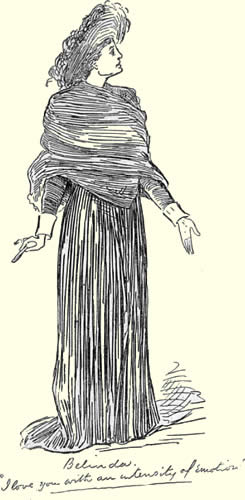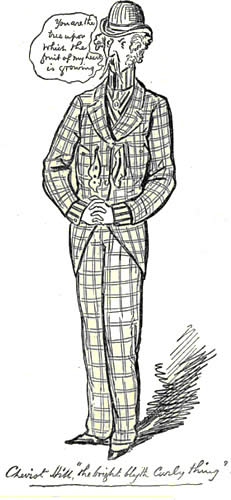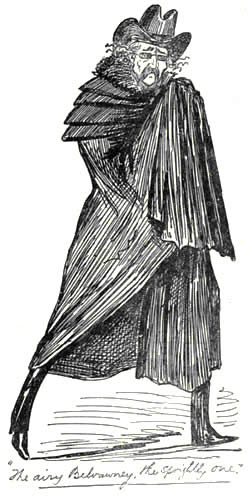 |
 |
||||||
Review from The Illustrated Sporting and Dramatic News.
OUR CAPTIOUS CRITIC.
IT seldom falls to the lot of a comic drama to evoke such diverse critical opinions as have generally been passed upon W. S. Gilbert's new and original piece Engaged, at the Haymarket Theatre. The fact that this farcical comedy has had the effect of initiating a certain kind of playgoer into the strongest expressions of condemnation, and of arousing in another kind of spectator the liveliest admiration and eulogy is the surest proof that it is an unique and remarkable production.
 |
 |
For my own part I will say at once that I consider Engaged the cleverest comic work that has proceeded from Mr. Gilbert's brilliant pen. Having begun by this admission, I must also confess that I have been altogether puzzled by the serious denunciations which have been levelled by critics against what they call the "heartless cynicism" of one of the most riotously humorous, whimsically incongruous, utterly comical burlesques it has ever been my lot to see or read. Indeed, when some of the critics of Engaged deduced from its three acts of grotesque drollery awful evidences of a mind diseased, a lacerated heart, more bitterly sceptical of human good than Dean Swift's sœva indignatio, more terrible than his against the human race, I protest I was fairly mystified. I went and saw the piece a second time, thinking that perchance upon my first visit I might not have sufficiently studied it to apprehend fully the import of its conception and its dialogue. But my impressions remained the same. I had an extra chuckle or so, perhaps, over one or two touches of grave banter that had previously escaped my notice. But after a careful consideration of the whole case I was quite unable to regard Engaged as anything more serious than a whimsical, satirical, exquisitely humorous extravaganza. Where is this bitter, heartless cynicism they talk so much about? I cannot find it. And although I appear before you in the character of a Captious Critic, I am not by any means an individual of misanthropical proclivities. On the contrary, I am, as a rule, inclined to think better of my species than by their general behaviour they warrant one in thinking. Then I believe I also know correctly what the term cynicism means in the drama. To go back in stage history, I think the comedies of Congreve and Wycherley, for example, as diabolically cynical, as they are grossly impure. To come to our own time, I consider the libretti of three-fourths of the French opéras-bouffes which have been translated with sufficient plainness into English, practically and palpably cynical, and they are indecent withal. I may say the same of some Palais Royal pieces, mightily popular amongst us, against which, although they did not escape unblamed, no charge of heartless cynicism has been brought.

I compare Mr. W. S. Gilbert's fanciful farce, Engaged, with the productions thus indicated, in all respects. And it seems to me that, while upon artistic grounds it is equal to the best of them it is less heartlessly cynical than any of them; it is as amusing as the most amusing of them; and it is untainted by a tinge of the indecent suggestiveness upon which all of them, ancient or modern, largely depend for their humour. Therefore I ask again why this talk of diseased minds, deformed imagination, wicked scepticism, sardonic hatred of the entire human race in connection with the new Haymarket piece?
That the satirical vein is characteristic of Gilbert's humour we are all aware. That there lives not a writer for our stage who has such a lively sense of the ironical and incongruous in social customs and ethics few will attempt to deny. But (from my point of view at all events) his cynicism being altogether intellectual and artistic, serves his dramatic purpose excellently, without doing violence to the feelings of the humane, or assisting the sneers of the vicious. It is your sensually cynical writer who does mischief and deserves reprobation. Yet he is generally applauded as a warm-hearted sort of person, whose scoffs at virtue, howsoever devilish, are but the outcome of a full-blooded and hilarious nature.
 |
 |
It is not my habit to detail the plot of any piece that I may discuss in this place. The plot of Engaged is very slight and episodical. But the balance of incident in the three acts is carefully preserved, and the episodes of the farce are arranged with artistic skill. When the play opens, the mock seriousness and realism of the events at first deceives the unwary spectator, who is about to prepare himself for domestic comedy. And the sudden surprise that jerks one into a consciousness of the drollery of the burlesque is a shock as exhilarating to an appreciative spectator as the first plunge into cold water is to an early riser. Angus MacAlaster's allusion to his honest calling, which consists chiefly in poaching, but is supplemented by the occasional upsetting of a tourist's train, is a purposely extravagant touch of burlesque, that ought to supply at the very outset, to any intelligent spectator, the key-note of the humour of the farce. Yet I was astonished to find one critic quoting it as an evidence of the author's utter and diabolical heartlessness. "The man who will make a pun will pick a pocket," remarked the learned lexicographer. The critic in question evidently argues upon equally sound premises, that the comic writer who can make a joke about the upsetting of a railway train must be guilty of something infinitely more criminal than petty larceny. Lord preserve us, we live in grave and parlous times! I cannot dwell at length upon the merits of the ten humorous characters who compose the dramatis personæ in Engaged. They and their amusing vagaries must be seen to be enjoyed. The beautiful Belinda Treherne, who loves her ]over with an "irrepressible intensity of devotion," but cannot forget that "business is business," is played by Miss Marion Terry with a sense of humour surprising to those who have only seen her in ingenue parts. Maggie M’Farlane, who so solemnly declares that she is a "verra verra beautiful girl, and a verra verra guid girl," is acted capitally by Miss Julia Stewart, who brings with her to the London stage a welcome freshness of style, and suits the part admirably. Belvawney "the airy, the sprightly one," has given Mr. Harold Kyrle an opportunity of greatly increasing his reputation—an opportunity he has made the most of. Mr. Howe as Mr. Symperson shows a broad and thorough appreciation of the caricature he has to embody. Of Angus MacAlaster, the lowland peasant lad, who so sympathetically announces to Cheviot Hill "the mon's waitin' outside ready to serve the bonnie writ on ye;" Mr. F. Dewar is an exponent of the character who could not easily be improved upon. As for Mr. George Honey in the leading part of Cheviot Hill, I have only to say that I disagree with those who think that the part requires a light comedy actor of the Palais Royal de Piccadilly school. No actor of that school could adequately understand or interpret it. Mr. Honey's appreciation of the true farcical nature of the entire thing is exquisite, and he has added yet another to the distinguished list of comic creations with which his name must always be connected. Miss Emily Thorne as the Lowland Widow is humorous and intelligent. Miss Lucy Buckstone is a pretty Minnie. Miss J. Roselle as Parker and Mr. Weathersby as Major M'Gillicuddy fill their respective parts well.
In conclusion, I will say that in my opinion Mr. Gilbert, following out a whimsical but definitely planned humour (a humour which peeped out first conspicuously in Tom Cobb) has produced a work that must influence the English comedy in a palpable way. I wish space and time had permitted me to dwell more deliberately upon the figures in Engaged. Had the piece originated in America, the English critics would have said: "Behold a new and original humorist who has shown us a style of comic drama hitherto unachieved."
Archive Home | Gilbert | Gilbert's Plays | Engaged
Page modified 25 October 2020